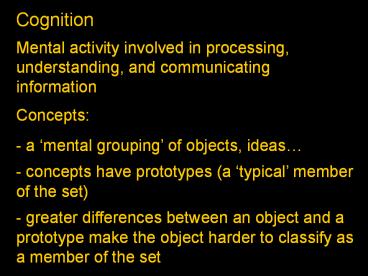Cognition
1 / 21
Title: Cognition
1
Cognition
Mental activity involved in processing,
understanding, and communicating information
Concepts
- a mental grouping of objects, ideas
- concepts have prototypes (a typical member of
the set)
- greater differences between an object and a
prototype make the object harder to classify as a
member of the set
2
Cognition
For example, we all have a concept of the idea of
dog
We also have a prototype for the concept of dog
3
Cognition
Concepts and the associated prototypes are basic
elements of thinking
Another basic element is the proposition
- propositions usually encode the relations among
concepts
- dog (concept)
- cat (concept)
- dogs hate cats (proposition)
4
Cognition
Propositions can be linked together to form a
cognitive schema
- all the propositions you have concerning the
relations among your concepts of various animals
add together to form your schema of the animal
kingdom
5
Cognition
Mental Imagery
- if we are sufficiently familiar with a concept
or prototype we often have a mental image
associated with it
- these images can occur in any sensory modality
- thinking of the image often produces very
similar brain activity to experiencing the real
thing
- mental rehearsal
6
Cognition
Problem Solving
Is 8409633026483027 a prime number?
Two possible types of approach
Algorithms step-by-step procedure that tests
every possible solution, and is guaranteed to
terminate (eventually)
Heuristics rule of thumb procedures that make
some a priori assumptions about the nature of
possible solutions
7
Cognition
Problem Solving
Is 8409633026483027 a prime number?
Algorithmic approach
- can the number be divided by 2?
- can the number be divided by 3?
- can the number be divided by 4?
- can the number be divided by 5?
8
Cognition
Problem Solving
Is 8409633026483027 a prime number?
Heuristic approach
- can the number be divided by 2?
(is it an even or odd number?)
- if the number is even, it is not a prime, if it
is odd, then it is a prime
9
Cognition
Problem Solving
An algorithm will get you the correct answer, but
it can be a very time consuming and inefficient
process
A heuristic may or may not get you the correct
answer, but it is faster and easier (and often
does get you the correct answer)
10
Cognition
Problem Solving
Both algorithms and heuristics are tools that can
be used for formal reasoning
- all relevant premises are known
- one (and only one) correct answer does exist
When this is not true (as is frequently the case)
other, informal, methods of reasoning are used
- dialectical reasoning
11
Cognition
Problem Solving
Dialectical Reasoning
- many unknown premises
- e.g., should I invest in Microsoft?
- no way to know everything that will affect the
companys future success
- assess all the good/bad things you know about
Microsoft, make a point by point comparison, use
some heuristics, and come to a decision
12
Cognition
Problem Solving
Both formal and dialectical reasoning are
conscious strategies used to solve problems
Many problems are solved in the absence of a
deliberately employed problem solving strategy
Insight can lead to solutions to problems, often
out of the blue
13
Cognition
Obstacles to Problem Solving
Confirmation Bias
We tend to look for and remember info that
confirms our ideas, and pay less attention to
info contradicting our ideas
14
What rule was used to generate the following
series of numbers?
1. Test your rule by using it to generate some
other number sets
2. Does your new number set follow my rule? (ask
me)
3. When you are confident that you have
identified my rule, state the rule
15
What rule was used to generate the following
series of numbers?
Discovered rules here probably involve ideas
like each number 2x the previous number or
series of even numbers
My Rule any 3 numbers a, b, c, such that a lt
b lt c
16
Cognition
Obstacles to Problem Solving
Fixation
We tend to fixate on a certain kind of solution,
which can prevent us from seeing other kinds of
solution
Using all 6 matches, form 4 equilateral triangles
17
What is the next item in the series?
?
18
Finding the solution requires not fixating on the
usual strategy, and trying something different
After that, it is pretty easy
19
Cognition
Obstacles to Problem Solving
Mental Set
If we find a successful strategy for solving a
problem, we tend to use the same strategy on
future problems
A mental set is a predisposition to think or
solve problems in a certain way
Similar to perceptual set, our predisposition to
only perceive certain aspects of the world
20
Cognition
Obstacles to Problem Solving
Functional Fixedness
We tend to think of strategies, solutions, and
other tools as being useful for a single
purpose only
21
How to Kill a Mouse































